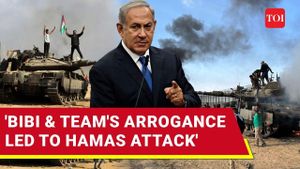Manipur, India, has once again become the harsh spotlight of violence as communal tensions boil over, leaving the fate of numerous individuals, including innocent women and children, hanging precariously. The ancient northeastern state has witnessed heartbreaking instances of targeted abductions, violent reprisals, and increasingly uncontrollable chaos. This gripping narrative unfolded most recently when Jiribam district became the battleground for conflicts between the warring ethnic groups of tribal Christians and Meitei Hindus.
Firstly, on November 12, reports surfaced accusing members of the Kuki-Zo, the Christian tribal community, of kidnapping 11 individuals from the Meitei Hindu community. Though security forces managed to intervene, saving five of those taken, the remaining six hostages—three children and several women—remain missing. Their fate amid the unforeseen turmoil remains unknown.
Conflict erupted fiercely as the community situations intensified. Jiribam has turned itself, almost overnight, from serene scenery to the epicenter of violence. Two dead bodies of Meitei Hindus were discovered shortly before the kidnappings, reportedly as retribution following police operations where officers shot members of the Kuki-Zo community. With hostilities rising between the groups, local authorities have not been able to contain or restore order.
“What we now witness is anongoing retaliation between these factions,” lamented one senior Church leader engaged in peace dialogues. He grimly noted, “The state has lost complete control of law and order.” The local atmosphere is thick with tension, struggling under shutdown orders and violent reports flooding the environment.
The root causes of this combustible situation could be traced back to earlier unrest, which ignited around May 2023 when the Meitei community began advocating for tribal status, which would grant them additional privileges under India’s affirmative action initiatives. With this push, fears swept through indigenous tribal groups, leading them to worry about future land purchases by Meitei Hindus. Since then, the state has seen over 230 deaths, and countless others have been displaced, particularly impacting the Christian tribal communities.
The recent wave of violence began with the tragic murder of an indigenous Kuki woman on the 7th of November, followed closely by police killings of 11 Kuki-Zo members on November 11. Federal officials rapidly reacted by deploying extra security personnel across the region to assist with restoring peace and protecting vulnerable communities.
The Indigenous Tribal Leaders’ Forum, representing the tribal population, vehemently condemned the killings of their members, who they called “village volunteers.” This forum acts as a political voice for these marginalized groups, rallying against the conflict as they call for peace and perseverance. Their collective concerns highlight how deeply ingrained the mistrust is between the conflicting parties.
The despair evident among tribal communities was shared by the World Kuki-Zo Intellectual Council, which expressed its dismay following the violent turn of events. “The hope for restoring peace has grown weaker,” expressed the Church leader, alarmed at the hardening violence and instabilities. Amid all this uncertainty, the Church has been acting as both witness and player, attempting to mediate and stabilize relationships affected by the crisis.
The Catholic Church, which plays an influential role within Manipur, has been involved independently, supporting afflicted families. Archbishop Linus Neli leads efforts from the diocese of Imphal, working to provide assistance to displaced families whose lives have been shattered through violence and coercion. Yet the continued conflict poses substantial challenges to these peace endeavors.
Reports of violence keep filtering through, resulting not only from clashes but also threats and kidnappings—a stark reminder of the fragile nature of peace within this vibrant region known for its cultural richness. Local residents, caught up simply because they share the same geographic space, face severe repercussions simply for belonging to the ‘wrong’ group.
Despite the grim reality, there may yet be dawn after the storm as political representatives retrieved from each side maintain open dialogues for negotiation. Nevertheless, political accusations emerge; local leaders, particularly from the Kuki-Zo community, blame the state’s Chief Minister, N. Biren Singh, for worsening tensions between communities, questioning the state and federal responses to violence.
The future for Manipur hangs dangerously on these interwoven issues of identity, land rights, and state responsibility—conflated so deeply with faith and culture. Ongoing cycles of retaliation symbolize not just bloodshed but years of built-up angst and unresolved conflicts. With confusing narratives circulating around killings and retaliations, many are left questioning the truth.
Can peace be restored where violence seems unavoidable? Will the fate of the missing be discovered? The urgent need for intervention from neutral locals and humanitarian organizations stands as other communities watch and learn about the turmoil the communities face. Everyone awaits next-step actions from authorities and peace mediators alike, hoping for insights on how the state will reclaim its fragile peace.
All eyes are on Manipur, where the toll of violence continues to rise, spinning the narrative ever so precariously. The overarching air of uncertainty persists, marking each day with the weight of fear—a poignant reminder of peace's delicate nature. Further confrontations or worse, escalations, could spell disaster for the populations already grappling with the fallout of years of ethnic and communal frictions. How can communities forge paths to reconciliation when each step lays burdened by mistrust and grief?



